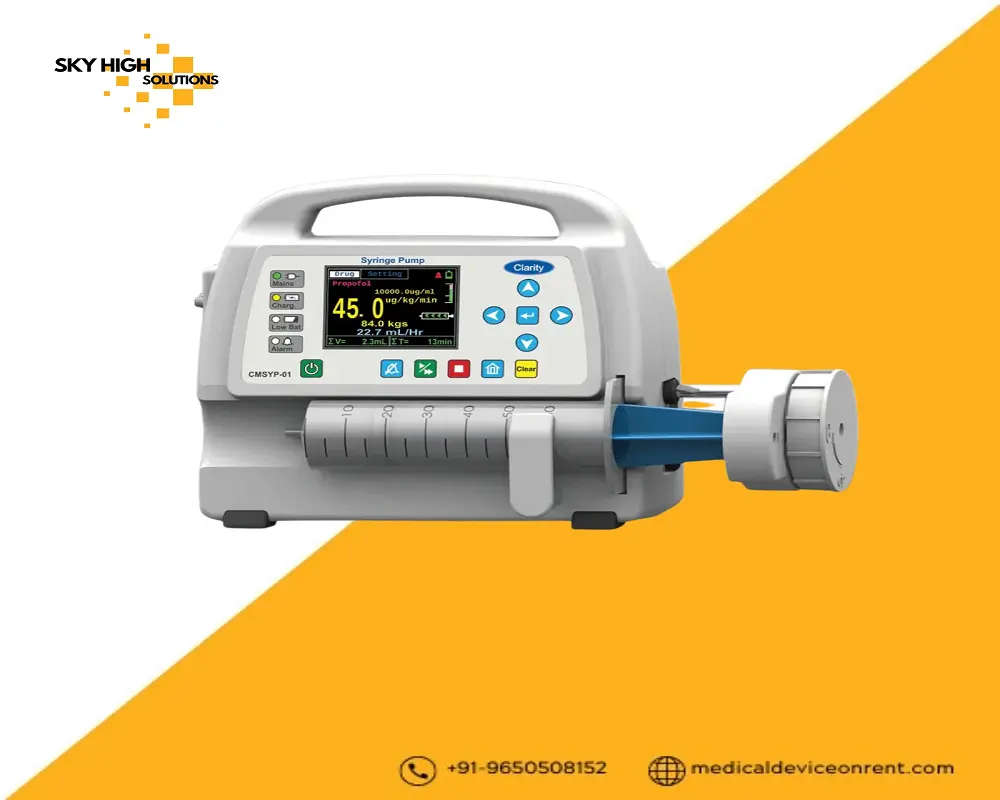When it comes to safe, accurate, and continuous delivery of critical medicines, syringe pumps play an essential role in both ICU (Intensive Care Units) and home care environments. These medical devices ensure that patients receive the right amount of medication at the right time, without interruption. In India, where home healthcare is rapidly growing, syringe pumps have become a lifesaver for families managing long-term or critical medical conditions at home.
This detailed and user-friendly guide explains how syringe pumps work, why they are used, and how they support patient care in both hospitals and home settings.
Also Read: Infusion Pump: Types, Uses & Benefits in Delhi NCR
1. What Is a Syringe Pump?
A syringe pump is a medical device designed to deliver small and accurate doses of medication into the patient’s body over a set period of time. The pump holds a syringe filled with medicine and administers it at a controlled speed—either slowly, continuously, or in small frequent doses.
These devices are widely used in:
- ICUs
- Emergency wards
- Neonatal units
- Cancer care units
- Home healthcare
Medications given through syringe pumps include insulin, painkillers, antibiotics, anesthesia drugs, cardiac medicines, and more.
2. Why Syringe Pumps Are Important in ICU Settings
In the ICU, every second matters. Patients need precise medication without delays or errors. Syringe pumps help doctors and nurses maintain stable and safe care.
a. Accurate Medication Delivery
ICU patients often require powerful medicines that must be given in exact doses. A minor mistake can impact the patient’s condition. Syringe pumps ensure 100% accuracy.
b. Continuous and Controlled Flow
Some drugs must enter the bloodstream slowly and steadily. Syringe pumps maintain a continuous flow that doesn’t stop—even during shift changes.
c. Essential for Critical Care Treatments
Syringe pumps are used for:
- Sedatives for ventilated patients
- Cardiac support medicines
- Pain management
- Neurological treatments
- Drugs requiring micro-dosing
d. Reduces Nurse Workload
In Indian hospitals, nurses often manage multiple patients. Syringe pumps automate medication administration, reducing workload and preventing manual errors.
e. Improved Patient Safety
With alarms, lock systems, and monitoring features, syringe pumps help ensure that dosage errors or interruptions do not occur.
3. Why Syringe Pumps Are Needed in Home Care Settings
Home healthcare in India is becoming popular because it is more comfortable, cost-effective, and convenient for patients who need long-term care. Syringe pumps make home treatment safe even without a full-time medical staff.
a. Ideal for Long-term Treatment
Patients such as those with cancer, chronic illnesses, or post-surgery conditions often require:
- Pain relief medication
- Nutrition therapy
- Antibiotics
- Sedation or controlled drug flow
Syringe pumps allow families to manage these treatments at home easily.
b. Easy for Caregivers to Use
Modern syringe pumps are designed with:
- Simple controls
- Digital displays
- Alarms for blockage or low battery
- Portable designs
Even family caregivers can operate them after basic training.
c. Prevents Hospital Readmission
By providing continuous medication at home, syringe pumps help patients recover faster without frequent trips to the hospital.
d. Cost-Effective Alternative
Renting a syringe pump is much more budget-friendly compared to hospital stays or buying the machine outright. This is especially helpful for Indian families managing long-term conditions.
e. Supports Palliative and End-of-Life Care
For patients who require continuous pain management, syringe pumps ensure comfort and dignity at home.
4. Key Features of Modern Syringe Pumps
A good-quality syringe pump comes with several advanced features that improve safety and efficiency, such as:
- Digital control panel
- Adjustable flow rate
- Occlusion alarms
- Battery backup
- Compatible with various syringe sizes
- Anti-bolus function (prevents sudden medicine push)
- Simple loading mechanism
These features make syringe pumps highly reliable for both ICUs and home care.
5. Who Should Use Syringe Pumps at Home?
Syringe pumps are helpful for patients dealing with:
- Cancer pain
- Neurological conditions
- Post-surgical recovery
- Severe infections requiring IV antibiotics
- Cardiac conditions needing controlled medication
- Paediatric or neonatal care
- Terminal or palliative care
A doctor’s advice is necessary before using a syringe pump at home.
6. Benefits of Renting a Syringe Pump in India
Instead of buying a new device, many Indian families prefer renting due to short-term requirements and affordability.
a. Low Cost and High Convenience
Renting allows families to get the device quickly at affordable monthly prices.
b. Free Installation and Demo
Reliable medical rental services provide:
- Home delivery
- Setup
- Demonstration
- Basic training
c. Maintenance and Replacement
Good service providers replace the device immediately if there is any technical issue.
d. Suitable for Short-Term Care
Most patients need syringe pumps only for 1–4 weeks, making rentals the best choice.
7. Tips for Safe Use of Syringe Pumps at Home
To ensure safety and effectiveness, follow these tips:
- Always check the syringe placement before use
- Make sure the flow rate is correctly set
- Charge the device regularly
- Keep the pump clean and dry
- Never change medicine dosage without doctor’s advice
- Contact service support if alarms keep beeping
These steps help avoid complications during home treatment.
Read Also: DVT Pump: Uses, Benefits, and Price Guide
8. Final Thoughts — A Lifesaving Device for Critical Care
Syringe pumps play a crucial role in delivering accurate medication to patients in both ICU and home environments. With their ability to control dosage precisely and safely, they have become a key device for managing critical conditions, chronic illnesses, and comfort care in India. Today, as more families prefer home-based treatments for convenience and affordability, the demand for advanced equipment like syringe pumps and medical device on rent in Gurgaon is steadily rising, making healthcare more accessible for patients who need continuous monitoring and reliable drug delivery support.
Whether you are caring for a patient at home or managing ICU operations, using a syringe pump ensures safety, comfort, and better treatment outcomes.
If you need a syringe pump for home use, your best option is to rent one from a trusted service provider.
Related Blogs: Syringe Pump Uses, Types, Benefits & Syringe Pump on Rent

